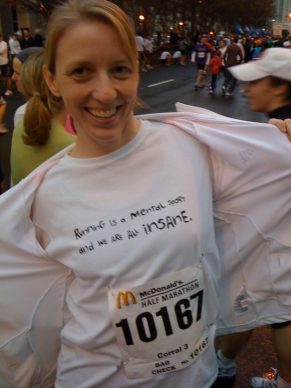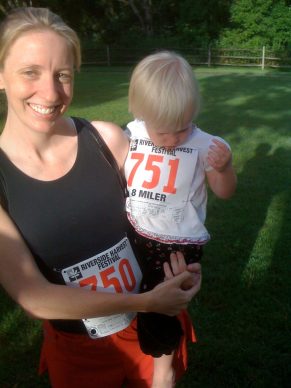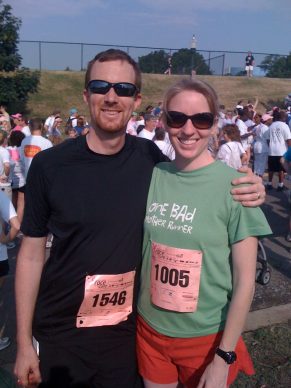Williamsburg, VA, July 2010
After her fourth consecutive miscarriage, Heather Oman turned to blogging to express her feelings about her experience and Mormon Mommy Wars was born. Heather also founded Living With PKD, an online community for people, like herself, with Polycystic Kidney Disease. Heather talks about what she does to take care of her body in the face of chronic illness and the important role of online support communities like the ones she’s founded.
You cofounded the popular blog Mormon Mommy Wars in 2005. How did you get started blogging?
My husband, Nathan, had a blog. Frankly, it sort of bugged me that he spent so much time on it. He tried to combat my frustration by suggesting that I participate in his blog, and then suggested that I start my own. He had seen my writing, which at that point was pretty minimal, and wanted to encourage me. At first, I wasn’t interested but eventually I changed my mind.
Mormon Mommy Wars started in 2005 in the middle of a particularly difficult time in my life. I was recovering from my fourth consecutive miscarriage. I was hurting and found that I craved other women’s stories. I wanted to read about how others managed miscarriage. I was also captivated by other mommy blogs—stories that weren’t about miscarriage but were a revelation to me—a light that said, “Hey, other women feel the same way!” My husband didn’t peruse mommy blogs, so I hadn’t realized this kind of stuff was available.

While I was going through this healing time, somebody wrote a comment on my husband’s blog about stillbirths and how muddled Mormon doctrine is when it comes to babies who are stillborn. I read it and there was a comment about miscarriage that I felt was flippant and disrespectful of the pain that miscarriage can cause. In the middle of my own miscarriage nightmare I thought, “What right does this man have to dismiss miscarriage? What does he know about how I’m feeling?” I locked myself in the bathroom, cried for ten minutes, came out and said to my husband, “I need a blog.” I wrote two or three posts, recruited another mom to help, and Mormon Mommy Wars was born.
I think one reason that MMW is successful is because our topics range from potty training to sleep habits to divorce to illegal immigration. I love that we can talk about so many different things and the diversity of our readers never ceases to amaze me. It’s a great testament to the fact that Mormons have different life perspectives and that you can have a different opinion than your sister in the gospel and still be a part of the greater community of Saints.
In 2006 you broke the news to Mormon Mommy War readers that you had been diagnosed with Polycystic Kidney Disease. What is PKD, and how has your diagnosis affected you and your perspective on life?
Polycystic Kidney Disease is the most common genetic disease in the country, but nobody has ever heard of it. It means that cysts that are growing in my kidneys are slowly replacing my kidney matter. As the cysts grow, so do my kidneys to compensate for the loss of function. Ultimately the cysts take over and the kidneys fail, requiring dialysis or a kidney transplant. My kidneys are now five times bigger than normal. My cysts vary in size, ranging from the size of a quarter to the size of an orange. There is no treatment for the disease, and no cure. There is also no pattern that anybody can point to as a prediction for how the disease will progress. Everybody progresses differently, so I could need a transplant in three years, or in ten. Right now it’s just a waiting game.
I look at my body differently now. I treat it better and view it more as a gift. After I was diagnosed, I thought about what would be my regrets if and when I ended up on a dialysis machine, and I realized my biggest one would be not using my body better. I want to get everything I can out of my body before it quits, so I started a serious exercise program. Previously, I was a girl who only exercised when it gave me an excuse to meet boys, so you can imagine how often I did it once that was no longer a priority. I never thought of myself having an unhealthy body and I certainly led a full life, but I was never particularly fit. After I made this exercise commitment, I started running races (short races initially) and then longer ones. Last year I finished my first half marathon. Currently I’m training for a duathlon, which involves a 5K run and an open ocean swim. I’ve never done anything like that before and I’m hoping I don’t drown! I’ve learned that there is nothing like pushing your body beyond what your expectations and having it deliver. I hope that keeping myself as fit as possible will help my kidneys and delay the transplant as long as possible.
Shortly after you were diagnosed, you started a blog to support others who have Polycystic Kidney Disease. What have you gained from creating this network and how have you seen it help others?
Not long after I was diagnosed I attended a conference for the PKD Foundation. It terrified me. I sat there thinking, “This is my life now?” It was confusing and overwhelming. I felt the same way I did when I had my miscarriages. I craved to hear other people’s stories. . . to find something to which I could relate. The Internet offered almost nothing, and the only support group I could find was through a list-serv. The problem with the list-serv is that I would get too many emails from people reporting all the bad things that were happening to them. I found it overwhelming and scary. I couldn’t deal with my own emotional adjustment and take on everybody else’s grief too. I unsubscribed from the list-serv and started my own blog, Living with PKD. I wanted to talk about what it was like living with this disease. I didn’t want it to be all about my labs, numbers and bad things. I wanted it to be about life in general with PKD.

My Living with PKD blog has afforded unexpected opportunities. For instance, I was contacted by the PKD Foundation and, for a while, I wrote a column for their patient magazine. That was a lot of fun and gave me a finger on the pulse of the community. In a roundabout way, my blog put me in contact with Dr. Steinman, one of the leading PKD researchers in the country. Dr. Steinman is running a drug trial out of Beth Israel Hospital in Boston, and I was able to learn about the study and be part of it.
The best part about the Living with PKD blog is the emails I get from readers. Readers share their stories, they ask me questions, they tell me that reading about my life is a comfort. One woman wrote, “Your life is so normal!” I’m glad that I can fill that need—the need to find something solid and normal when it feels like the ground is shifting underneath you. There was nothing like that for me when I started blogging and it’s nice to know that I can provide that for someone else. Knowing that another person is going through the exact same trial that you are going through makes that trial, any trial, more bearable; whether you’re a mom who can’t get her toddler to stay in a crib, or a patient trying to figure out how to read a lab report. I think at the end of the day, that’s what blogging is about.
In the blogosphere, you are careful to protect your family’s privacy. While you write about your life, you don’t place photographs of your family on your blogs. You also don’t use your children’s names. Why is that important to you?
I am extremely careful about names and photos on the blog (photos really more than names). It’s important to keep your kids’ images off the Internet because you don’t know where those images could end up. It makes me uncomfortable having pictures of my children on the Internet for strangers to look at. I also feel like with everything else I’m revealing about my family, my kids deserve a boundary. My son is old enough to have opinions about what I blog about now, so much that he even asks me not to blog about certain things. It’s a fine privacy line that bloggers ”walk.”
Before you had children you graduated from Boston University in Communication Disorders, and completed a master’s degree in Speech and Language Pathology at George Washington University. You left your career to raise two children. Was that a difficult decision?
My transition to a full time stay-at-home mom was a gradual one. Up until about four years ago I worked in some capacity in speech and language pathology, even if it was only eight hours a week. Then I became unexpectedly pregnant with my daughter. The pregnancy was high-risk so I quit working altogether and have been full time at home ever since. I know it was the right decision, but yes, I’ll admit that it was hard to leave the profession altogether. Being a speech and language pathologist is an exciting, dynamic and interesting career. On the other hand, being a mom is the best thing I’ve ever done, but it’s not exactly always the most exciting.
Before staying home, I worked for six years with the adult population in hospitals and care facilities, assisting patients with strokes, dementia, voice and swallowing disorders. I had some pretty big career dreams and still do. I can’t pretend that giving them up was easy. Still, even though I struggle with my decision to be a stay-at-home mom full time, I have never regretted it. Struggling with a decision is different than regretting it.

How did you decide to go into speech and language pathology?
It started out as a fluke. My senior year in high school I was taking a life skills class at the University of Utah for college credit. I took a personality test, and the results said that I would be good at speech language pathology (SLP). It sounds silly, I know, but I had never heard of it so I started researching the profession. At the time, I was really into singing and debate. A speech and language pathologist came to our debate class to discuss proper vocal use and I was fascinated. Being a SLP seemed to combine my love of all things voice and all things language. I wasn’t a big science person, so the first part of my education came as a shock. I struggled through the anatomy and physiology requirements of my major, but ended up loving that part of it. Ironically my career has been completely focused on the medical aspect of the field, something that I wouldn’t have predicted when I signed up for the profession.
Do you feel that education has enriched your life as a mother?
My son jokes that I know everything there is to know about the body, and we’ve had some fun pouring over my anatomy books. My children also know that education is a priority in our family, which I hope is a reflection of their parents’ educational choices. I think my education enriches the way I mother, but it’s hard to tell how anything really affects what you do. I think more than anything, my education provided me some interesting experiences, which definitely shaped part of my personality. And I also have some fun stories to tell my children.
At A Glance
Heather Bennett Oman
 Location: Williamsburg, VA
Location: Williamsburg, VA
Age: 34
Marital status: Married 11 years
Children: two, ages 8 and 2
Occupation: Speech Language Pathologist, now a SAHM
Schools Attended: Boston University (BS in Communication Disorders), George Washington University (graduate school—MS in Speech Language Pathology)
Languages Spoken at Home: English
Favorite Hymn: “A Poor Wayfaring Man of Grief”
Current Church Calling: Gospel Doctrine teacher, Assitant Stake public affairs director
On the Web: mormonmommywars.com
Interview by Marintha Miles. Photos used with permission.
At A Glance
